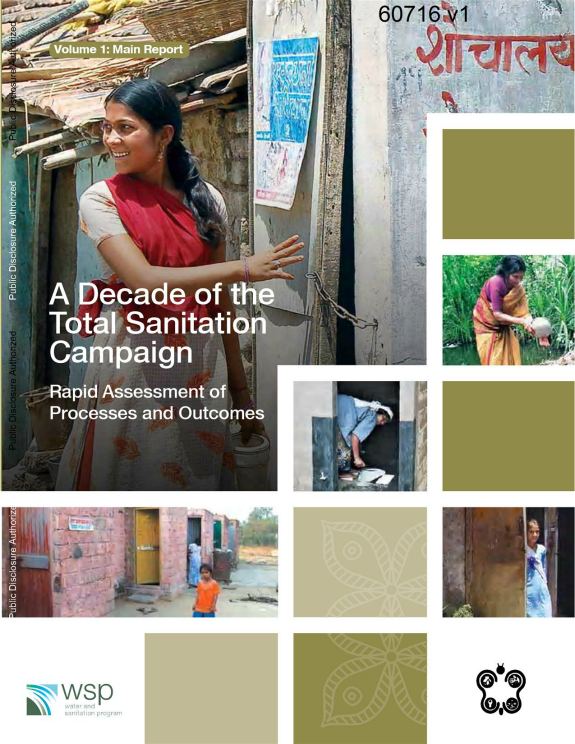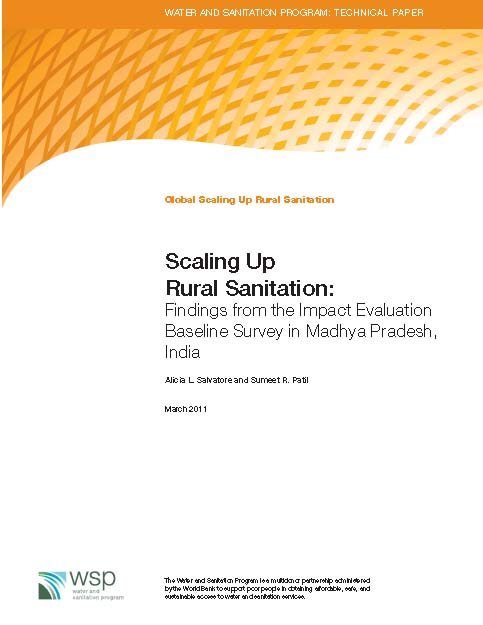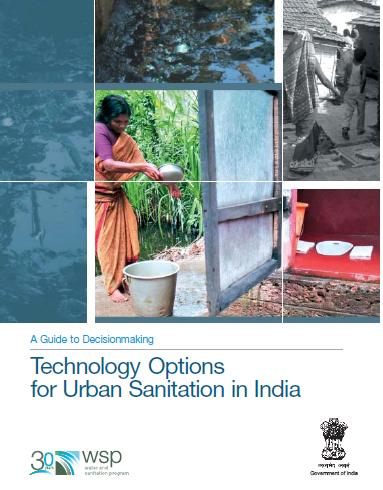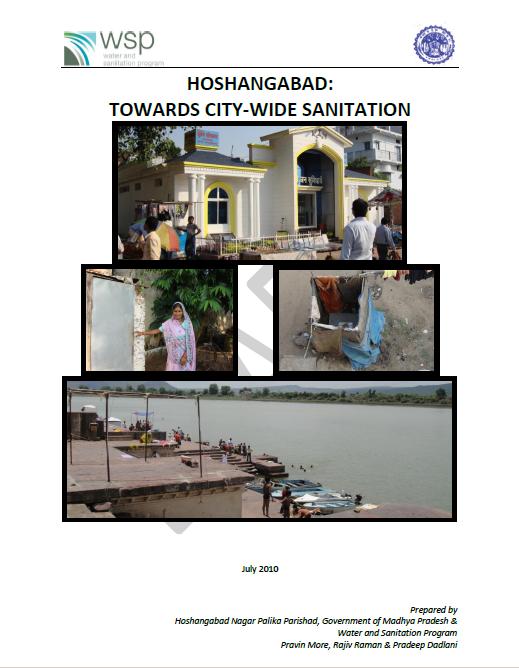Water and Sanitation Program (WSP)
The Karnataka Urban Water Sector Improvement Project: 24x7 water supply is achievable- Field note by Water and Sanitation Programme, World Bank
Posted on 14 Sep, 2012 07:28 PMThis field note by the Water and Sanitation Program, describes how it is possible to deliver twenty four water supply through individual household connections to all residents.
Trends in private sector participation in the Indian water sector: A critical review - A Water and Sanitation Programme publication
Posted on 23 Feb, 2012 05:54 PMThe study also analyses the direction in which the sector is heading with respect to private sector participation. Since most PPPs are at early stages of operation, this study focuses only on learnings from PPP design and transaction. This study does not seek to assess the operating or financial performance of PPPs.
A decade of the Total Sanitation Campaign - Rapid assessment of processes and outcomes - A report by the World Bank
Posted on 01 Nov, 2011 10:07 PM This report by the Water and Sanitation Program (WSP), The World Bank analyses primary and secondary data from the Total Sanitation Campaign (TSC) of the Government of India, which has been in operation for over a decade (1999 to date).
This report by the Water and Sanitation Program (WSP), The World Bank analyses primary and secondary data from the Total Sanitation Campaign (TSC) of the Government of India, which has been in operation for over a decade (1999 to date).
The audience for this report includes policy-makers and implementers at national, state and district levels, and the broader sanitation and hygiene community. The report aims at gaining an understanding of the processes, outputs and outcomes of the campaign at a national level and across the states as compared with the inputs that have gone into the program.
The report draws on these indicators, which are then compared individually and in combination to benchmark the states, to understand the relative performance of the states. This benchmarking, based on a combination of eight indicators, is undertaken for both states and districts across the country.
Establishment and management of community sanitary complexes in rural areas - A handbook by Water and Sanitation Program
Posted on 28 Jun, 2011 10:45 PM It is intended primarily for programme implementers to help them understand the critical need for Community Sanitary Complexes and inform them of the guiding principles to be adopted while planning for these.
It is intended primarily for programme implementers to help them understand the critical need for Community Sanitary Complexes and inform them of the guiding principles to be adopted while planning for these.
India remains one of the countries wherein concerted efforts are still required to eliminate the practice of open defecation. The lack of priority given to safe confinement and disposal of human excreta poses significant health risks manifest in the sanitation challenge facing the nation today.
The provision of sanitation facilities through public toilet complexes is the most suitable option for those who cannot afford individual toilets for monetary reasons or due to lack of space, and opt for open defecation. Such complexes are a useful and valuable option at public places, markets, taxi stands, etc., where a large congregation of people takes place. The Community Sanitary Complex (CSC) fosters the cognitive development of healthy sanitation practices in the community.
Alternate management approaches for village water supply systems - Case studies from Maharashtra - A field note by WSP
Posted on 23 Jun, 2011 05:25 PMIt documents the approaches in a context where the state government agencies responsible for construction and management of rural water supply systems have been found to be facing limitations in O&M arrangements.
The traditional approach to provision of rural water supply in India has been supply driven, with emphasis on norms and targets and on construction and creation of assets, but with very little concern for sustainable arrangements for better management and maintenance of the facilities built. The viewpoint that users are ‘beneficiaries’ rather than empowered stakeholders among the service providers has led to alienation of the users.
Monitoring systems for incentive programmes - Learning from large scale rural sanitation initiatives in India
Posted on 14 Jun, 2011 03:45 PMScaling up rural sanitation: Findings from the impact evaluation baseline survey in Madhya Pradesh – A report by the Water and Sanitation Program of the World Bank
Posted on 18 Apr, 2011 08:20 AM This report by the Water and Sanitation Program (WSP) of the World Bank presents the findings of the baseline and community survey conducted in two districts of Madhya Pradesh (MP) - Dhar and Khargone. The goal of the program is to reduce the risk of diarrhea and therefore increase household productivity by stimulating demand for sanitation in the lives of people. The program also seeks to stimulate the supply of appropriate sanitation program and services by conducting market research and training local artisans to build the relevant facilities.
This report by the Water and Sanitation Program (WSP) of the World Bank presents the findings of the baseline and community survey conducted in two districts of Madhya Pradesh (MP) - Dhar and Khargone. The goal of the program is to reduce the risk of diarrhea and therefore increase household productivity by stimulating demand for sanitation in the lives of people. The program also seeks to stimulate the supply of appropriate sanitation program and services by conducting market research and training local artisans to build the relevant facilities.
In India, the program is supporting the Government of India’s (GoI) Total Sanitation Campaign (TSC) in two States: Himachal Pradesh and Madhya Pradesh. The main components of the intervention include: Community-Led Total Sanitation (CLTS), Social Marketing of Sanitation, Strengthening the Enabling Environment and Nirmal Gram Puraskar (NGP) Awards.
Technology options for urban sanitation in India - A guide to decision making by WSP and MoUD (2008)
Posted on 11 Apr, 2011 12:20 AM This guide by the Water and Sanitation Program and the Ministry of Urban Development, is meant to enable municipalities and urban local bodies make informed decisions on sanitation technologies.
This guide by the Water and Sanitation Program and the Ministry of Urban Development, is meant to enable municipalities and urban local bodies make informed decisions on sanitation technologies.
Poor sanitation facilities and the lack of sanitation facilities are a health hazard and exact a human toll on human health. Realising the magnitude of the problem and the resulting fallout, the Government of India has been increasing the funding for sanitation infrastructure via the Jawaharlal Nehru National Urban Renewal Mission (JNNURM). However, money alone cannot solve the problem. Urban local bodies and municipalities need sound advice on technological options, planning and implementation to ensure that the money is well spent and the sanitation projects cater to the need of the target audience.
Hoshangabad - Towards city wide sanitation - A draft report by Hoshangabad Nagar Palika Parishad and WSP
Posted on 10 Apr, 2011 01:57 AM  This proposal prepared by Hoshangabad Nagar Palika Parishad, Government of Madhya Pradesh and Water and Sanitation Programme South Asia, is meant to ensure that every household in this town adopts safe sanitation practices and is to help enable the urban local body, implement a city wide sanitation programme that finally ensures collection and treatment of waste.
This proposal prepared by Hoshangabad Nagar Palika Parishad, Government of Madhya Pradesh and Water and Sanitation Programme South Asia, is meant to ensure that every household in this town adopts safe sanitation practices and is to help enable the urban local body, implement a city wide sanitation programme that finally ensures collection and treatment of waste.
This document is the tenth mile stone in the process of achieving the goal of city-wide sanitation for Hoshangabad.
Benchmarking local government performance on rural sanitation in Himachal Pradesh - A learning note by WSP
Posted on 06 Jan, 2011 06:43 AMThis document deals with benchmarking local government performance on rural sanitation in Himachal Pradesh. To strengthen outcome-focused management of the rural sanitation sector in India, the Water and Sanitation Program’s (WSP) Global Scaling Up Sanitation Project, in partnership with the Government of Himachal Pradesh, developed a five-step process to monitor and benchmark performance on a monthly basis across all twelve districts in the state. Applied at the local government (district) level, this process has proven to be an effective approach, one that can improve reporting, monitoring, and performance.